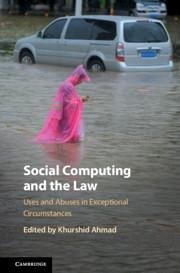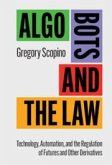Social Computing and the Law
Uses and Abuses in Exceptional Circumstances
Herausgeber: Ahmad, Khurshid
Social Computing and the Law
Uses and Abuses in Exceptional Circumstances
Herausgeber: Ahmad, Khurshid
- Gebundenes Buch
- Merkliste
- Auf die Merkliste
- Bewerten Bewerten
- Teilen
- Produkt teilen
- Produkterinnerung
- Produkterinnerung
A compilation of expertise in Internet law and in ethical considerations concerning social computing in emergencies.
Andere Kunden interessierten sich auch für
![Algorithms and Law Algorithms and Law]() Algorithms and Law124,99 €
Algorithms and Law124,99 €![Harmonizing Intellectual Property Law for a Trans-Atlantic Knowledge Economy Harmonizing Intellectual Property Law for a Trans-Atlantic Knowledge Economy]() Harmonizing Intellectual Property Law for a Trans-Atlantic Knowledge Economy202,99 €
Harmonizing Intellectual Property Law for a Trans-Atlantic Knowledge Economy202,99 €![Our Word Is Our Bond Our Word Is Our Bond]() Marianne ConstableOur Word Is Our Bond108,99 €
Marianne ConstableOur Word Is Our Bond108,99 €![The Liberal-Welfarist Law of Nations The Liberal-Welfarist Law of Nations]() Emmanuelle JouannetThe Liberal-Welfarist Law of Nations115,99 €
Emmanuelle JouannetThe Liberal-Welfarist Law of Nations115,99 €![The Cambridge Handbook of Disaster Law and Policy The Cambridge Handbook of Disaster Law and Policy]() The Cambridge Handbook of Disaster Law and Policy197,99 €
The Cambridge Handbook of Disaster Law and Policy197,99 €![The Cambridge Handbook of Technological Disruption in Labour and Employment Law The Cambridge Handbook of Technological Disruption in Labour and Employment Law]() The Cambridge Handbook of Technological Disruption in Labour and Employment Law194,99 €
The Cambridge Handbook of Technological Disruption in Labour and Employment Law194,99 €![Algo Bots and the Law Algo Bots and the Law]() Gregory ScopinoAlgo Bots and the Law132,99 €
Gregory ScopinoAlgo Bots and the Law132,99 €-
-
-
A compilation of expertise in Internet law and in ethical considerations concerning social computing in emergencies.
Produktdetails
- Produktdetails
- Verlag: Cambridge University Press
- Seitenzahl: 176
- Erscheinungstermin: 11. Oktober 2018
- Englisch
- Abmessung: 238mm x 159mm x 17mm
- Gewicht: 364g
- ISBN-13: 9781108428651
- ISBN-10: 1108428657
- Artikelnr.: 51150183
- Herstellerkennzeichnung
- Libri GmbH
- Europaallee 1
- 36244 Bad Hersfeld
- gpsr@libri.de
- Verlag: Cambridge University Press
- Seitenzahl: 176
- Erscheinungstermin: 11. Oktober 2018
- Englisch
- Abmessung: 238mm x 159mm x 17mm
- Gewicht: 364g
- ISBN-13: 9781108428651
- ISBN-10: 1108428657
- Artikelnr.: 51150183
- Herstellerkennzeichnung
- Libri GmbH
- Europaallee 1
- 36244 Bad Hersfeld
- gpsr@libri.de
1. Introduction
1.1. A note on terminology
1.2. Security, privacy, and dignity during an emergency
1.3. Our contribution: disasters, technology, law and ethics
1.4. Structure of the book
2. Social computing systems and ethical considerations
2.1. Introduction
2.2. Key ethical challenges posed by social computing systems
2.3. Technology mediated protection of data and persons
2.4. Conclusion
3. Internet laws
3.1. Introduction
3.2. Internet governance systems: self-regulation, technical regulation and governmental regulation
3.3. Ownership of personal data harvested from social computing systems
3.4. Protection for monitoring and harvesting information on social media
3.5. Summary findings
4. Copyright law and data protection law
4.1. Introduction
4.2. EU copyright directives and German copyright law
4.3. The ontology of copyright
4.4. Copyright and exceptional circumstances: disaster management
4.5. Exceptions and limitations
4.6. Summary
5. EU human rights framework
5.1. Introduction
5.2. Approach
5.3. Disaster management and human rights
5.4. EU fundamental rights framework and disaster management
5.5. Conclusion
6. Conclusion: legally using social computing streams and privacy protection
6.1. Introduction
6.2. Social computing analysis in exceptional circumstances
6.3. Checklist of legal issues
6.4. Risk analysis
6.5. Conclusion.
1.1. A note on terminology
1.2. Security, privacy, and dignity during an emergency
1.3. Our contribution: disasters, technology, law and ethics
1.4. Structure of the book
2. Social computing systems and ethical considerations
2.1. Introduction
2.2. Key ethical challenges posed by social computing systems
2.3. Technology mediated protection of data and persons
2.4. Conclusion
3. Internet laws
3.1. Introduction
3.2. Internet governance systems: self-regulation, technical regulation and governmental regulation
3.3. Ownership of personal data harvested from social computing systems
3.4. Protection for monitoring and harvesting information on social media
3.5. Summary findings
4. Copyright law and data protection law
4.1. Introduction
4.2. EU copyright directives and German copyright law
4.3. The ontology of copyright
4.4. Copyright and exceptional circumstances: disaster management
4.5. Exceptions and limitations
4.6. Summary
5. EU human rights framework
5.1. Introduction
5.2. Approach
5.3. Disaster management and human rights
5.4. EU fundamental rights framework and disaster management
5.5. Conclusion
6. Conclusion: legally using social computing streams and privacy protection
6.1. Introduction
6.2. Social computing analysis in exceptional circumstances
6.3. Checklist of legal issues
6.4. Risk analysis
6.5. Conclusion.
1. Introduction
1.1. A note on terminology
1.2. Security, privacy, and dignity during an emergency
1.3. Our contribution: disasters, technology, law and ethics
1.4. Structure of the book
2. Social computing systems and ethical considerations
2.1. Introduction
2.2. Key ethical challenges posed by social computing systems
2.3. Technology mediated protection of data and persons
2.4. Conclusion
3. Internet laws
3.1. Introduction
3.2. Internet governance systems: self-regulation, technical regulation and governmental regulation
3.3. Ownership of personal data harvested from social computing systems
3.4. Protection for monitoring and harvesting information on social media
3.5. Summary findings
4. Copyright law and data protection law
4.1. Introduction
4.2. EU copyright directives and German copyright law
4.3. The ontology of copyright
4.4. Copyright and exceptional circumstances: disaster management
4.5. Exceptions and limitations
4.6. Summary
5. EU human rights framework
5.1. Introduction
5.2. Approach
5.3. Disaster management and human rights
5.4. EU fundamental rights framework and disaster management
5.5. Conclusion
6. Conclusion: legally using social computing streams and privacy protection
6.1. Introduction
6.2. Social computing analysis in exceptional circumstances
6.3. Checklist of legal issues
6.4. Risk analysis
6.5. Conclusion.
1.1. A note on terminology
1.2. Security, privacy, and dignity during an emergency
1.3. Our contribution: disasters, technology, law and ethics
1.4. Structure of the book
2. Social computing systems and ethical considerations
2.1. Introduction
2.2. Key ethical challenges posed by social computing systems
2.3. Technology mediated protection of data and persons
2.4. Conclusion
3. Internet laws
3.1. Introduction
3.2. Internet governance systems: self-regulation, technical regulation and governmental regulation
3.3. Ownership of personal data harvested from social computing systems
3.4. Protection for monitoring and harvesting information on social media
3.5. Summary findings
4. Copyright law and data protection law
4.1. Introduction
4.2. EU copyright directives and German copyright law
4.3. The ontology of copyright
4.4. Copyright and exceptional circumstances: disaster management
4.5. Exceptions and limitations
4.6. Summary
5. EU human rights framework
5.1. Introduction
5.2. Approach
5.3. Disaster management and human rights
5.4. EU fundamental rights framework and disaster management
5.5. Conclusion
6. Conclusion: legally using social computing streams and privacy protection
6.1. Introduction
6.2. Social computing analysis in exceptional circumstances
6.3. Checklist of legal issues
6.4. Risk analysis
6.5. Conclusion.








